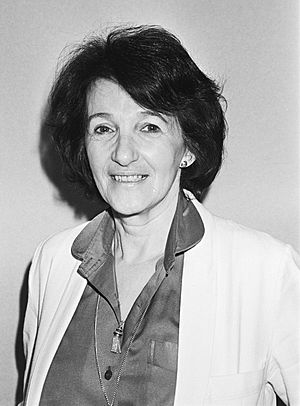Marga Minco facts for kids
Quick facts for kids
Marga Minco
|
|
|---|---|

Minco in 1981
|
|
| Born | Sara Menco 31 March 1920 Ginneken, Netherlands |
| Died | 10 July 2023 (aged 103) Amsterdam, Netherlands |
| Pen name | Marga Minco |
| Occupation | Journalist, writer |
| Language | Dutch |
Marga Minco (whose real name was Sara Menco) was a Dutch journalist and writer. She was born on March 31, 1920, and lived a very long life, passing away on July 10, 2023, at the age of 103. She is famous for her books that often talk about the impact of World War II on people's lives.
Marga Minco's Life Story
Marga Minco was born in a place called Ginneken in the Netherlands. She came from a Jewish family. In 1938, she started working as a journalist for a newspaper. Her last name was actually Menco, but because of a small mistake by an official, it became Minco.
When Germany invaded the Netherlands in May 1940, things changed. Even before new rules against Jewish people were announced, Marga was fired from her job. This was because the newspaper's leaders supported the Germans.
During the early part of World War II, Marga lived in different cities like Breda, Amersfoort, and Amsterdam. She got a mild illness and had to be treated in hospitals. In late 1942, she went back to Amsterdam to be with her parents. They were forced by the German soldiers to move into a special area for Jewish people, called the Jewish Quarter.
Later in the war, Marga's parents, her brother, and her sister were all taken away. Marga managed to escape being arrested. She spent the rest of the war hiding from the Germans. She was the only one in her family to survive. During this time, she even got a new name, Marga Faes, to stay safe. She continued to use "Marga" later on.
Marga married a poet and translator named Bert Voeten. They had met in 1938 and hid together during the war. Bert passed away in 1992. After the war, Marga and Bert worked for different newspapers and magazines. They had two daughters, and one of them, Jessica Voeten, also became a writer. Marga Minco turned 100 years old in March 2020 and passed away in July 2023.
Her Books and Stories
In 1957, Marga Minco published her first book, Het bittere kruid (which means "The bitter herb"). This book tells the story of a character who goes through war experiences similar to Marga's own. The character in the book does not have a name.
Another one of her books is called Een leeg huis ("An empty house"). The title of this book means two things. It refers to the damaged house the main character finds after hiding during the war. It also talks about the empty feeling that she and her friend have after the war. Many people in the Netherlands were not always welcoming to those who returned from the concentration camps. Marga Minco wrote more about this in her collection of short stories called De andere kant ("The other side").
Marga Minco's writing often explores how people feel after surviving terrible events like the Holocaust. Her main characters often feel that their lives don't have much meaning. They often survived the war by chance, while their family and friends were killed. For example, in her story De val ("The Fall"), a character named Frieda Borgstein survives the entire war by luck. Her husband was killed by the Nazis. But then, just before her 85th birthday, she dies by accidentally falling into a well.
Awards She Won
Marga Minco received many important awards for her writing:
- 1957 – Bureau voor Postreclame en Adressen De Mutator N.V. Short-story Prize for Het adress
- 1958 – Vijverberg Prize for Het bittere kruid
- 1999 – Annie Romein Prize for her entire collection of works
- 2005 – Constantijn Huygens Prize for her entire collection of works
- 2019 – P.C. Hooft Award for her entire collection of works
See also
 In Spanish: Marga Minco para niños
In Spanish: Marga Minco para niños
 | Shirley Ann Jackson |
 | Garett Morgan |
 | J. Ernest Wilkins Jr. |
 | Elijah McCoy |

